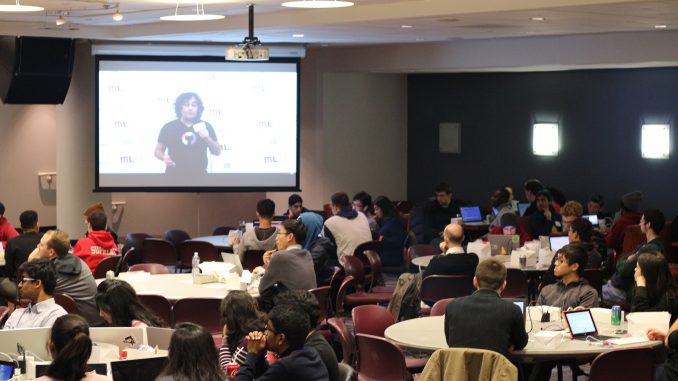
Vuk Petrovic has participated in more than 20 hack days in his life.
On Saturday, students from regional universities gathered in the Student Center for the 12-hour Local Hack Day, an opportunity to brainstorm and create new life “hacks” with technology. One hundred and eighty-six students registered for the event, and participants came to Temple from other schools including Drexel University and Lehigh University.
“Local Hack Day is a worldwide event,” said Petrovic, a senior computer science major and one of the 15 event organizers. “All around the world, local communities are getting together to organize little, mini hackathons to bring their community together and celebrate technology.”
The students were put into teams of four to create technological projects, like web apps, mobile apps or hardware hacks.
“You’re just taking a bunch of different technologies and figuring out an innovative way to use them,” Petrovic said.
For Local Hack Day, students created “life hacks” — they worked quickly to create something that improves lives, is interesting or gives people a new way to think about technology.
“The purpose is to unify the community so people can learn technology, get out there, get some experience, see what it’s like to work in a real world setting and also be able to talk to actual experienced engineers from real companies and network,” Petrovic said.
This was Temple’s first time hosting a Local Hack Day. The event was organized by two groups: TUDev, a program that works with student organizations and the Computer & Information Sciences department to get more students interested in coding and technology, and Temple’s chapter of the IEEE, a national organization that works to build connections among student engineers.
Investment management companies like SEI Investments, Vanguard and Guru sponsored the event.
Jae Kim was excited to attend the event because of potential networking opportunities with sponsor companies.
“You meet new people, employers and you learn new things,” said Kim, a junior computer science major. “You come here on your spare time, and it shows that you actually care about what you do and that you’re interested in what you do.”
Fnu Frangky, a junior computer science major, said he came to the event to learn things that aren’t on his syllabi.
“Most of this material that we’re taught at school are just concepts, but we’re doing practical things here,” he said. “It’s a good way to learn.”
At the end of the event, participants presented their creations like they would at a science fair. Students had all of their hacks lined up and judges took notes. The finalists received prizes from the sponsors, like an SEI prize, a Guru prize and a Vanguard prize. They were announced at the front stage.
The two groups that won the SEI prize were Pink Hat, comprised of Mohammad Alqudah, Daniel Bubovoy and Nermin Shaban, and SSM, which was made by Joshua Lloret.
The winner of the Guru prize was the group MedUber, with members Jinzhu Deng, Sarah Lehman, Dusan Ramljak, Sergei Iakhnitskii and Stephen Osei-Akoto.
The winner of the Vanguard prize was a team called Virtual Service Dog, with Triston Simons and Jamie Chang.
“I’ve heard stories where hackathon projects have actually turned into start-ups and turned into real-world products,” Petrovic said. “It’s really exciting.”
TUDev plans on having a larger, 24-hour hackathon in a couple semesters.
“This [event] is incredible,” he added. “This is our chance to get our name out there and make a nice thing for the Temple Community.”
Taylor Horn can be reached at taylor.suzanne.horn@temple.edu.


Be the first to comment